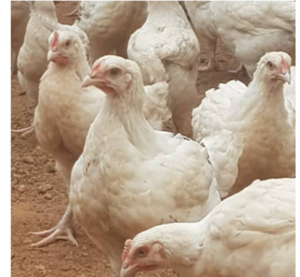Exploring Mobile Apps for Business during Lockdown
In Uganda, just like in any other countries, the nationwide COVID-19 lockdown brought dissolutions to many businesses. However, against all odds, some Women in Uganda found innovative ways to make their businesses survive. A Ugandan entrepreneur Sandra Auma is one of them.

Ugandan entrepreneur Sandra Auma
Within a few weeks, Sandra, who is also popularly known as ‘SuperMum’ at her Women’s Group, will be selling chickens she has been rearing and is hoping to make enough profit to clear off her debts.
Auma’s reality is that of many a poultry farmer, where patience is key in getting good product that will later translate to profits. She admits that nothing could have prepared her for the declaration of a national lockdown earlier in the year. Movement was prohibited and businesses stopped from operating except essential ones among them food vendors and health practitioners.
Six months before lockdown, she had begun her poultry business and had built a client base that mainly consisted of restaurants and street vendors who sell roast chicken usually next to bars. They often who buy in bulk an aspect that most poultry sellers appreciate. “The more days you keep the birds, the more money spent to feed them yet the price of the birds cannot be increased,” Auma shares.
Following the lockdown, she lost her client base overnight and had to rethink of other ways of dealing with the excess supply of live chickens she had. One option was to slaughter all the birds and freeze them. However, she did not have a deep freezer nor the resources to purchase one at the time. This option was also negated by the country’s unstable power supply and the additional cost of electricity for an uncertain duration.
Tapping into mobile App potential
As she was still weighing other options, Auma contacted a friend via WhatsApp to share her plight and seek ideas. Her friend offered to buy several birds from her and it is during this transaction that the idea of selling on Whatsapp occurred to her.
She thereafter contacted all her friends on WhatsApp, posted on the groups she was in and also asked her friends to add her to other corporate groups they were members of. In the respective WhatsApp groups, Super Mum openly shared her plight of having birds to sell but no market since restaurants and street vendors were closed; all the while urging them to place an order. Empathy coupled with the friendly retail price, resulted in Auma having an overwhelming number of advance orders made.
“This came with a challenge, I received orders across the wider districts covering more than 3,000 square kilometers. I had to make deliveries without hiking the prices. Then I had an epiphany to use my farmhand to make deliveries using a bicycle. I added an extra two thousand shillings on delivery regardless of how many birds or how far. For cost-effectiveness’, they combined orders going to similar routes…This also created extra income for the shamba boy and the motorcyclist who were also struggling financially at the time, as carrying persons on bodabodas (motorbikes) had also been banned”
Success in a crisis

At the end of two months, Auma had sold out her five hundred (500) birds, without reducing the price. To her advantage, she had also managed to convince her sister Keke, who she says is an excellent cook, to launch Keke’s Fried Chicken. The more orders Keke received, the more birds Super Mum sold.
Despite this innovative venture, Auma still incurred some losses because the populace was generally hard-up, and the birds were sold between 6-8 weeks, which meant spending a little more money on feeding them.
Her margin of loss is however negligible compared to other colleagues who had to slash their prices by nearly half the usual market price. During the lockdown, the food prices were cut down. Broilers, which she usually deals with, cost ten thousand shillings (10,000) but due to limited market access and cautious spending by the populace, many farmers slashed prices to almost half.
She not only established herself as an online farmer but also connected with other farmers to sell their birds when she had none. Auma has since reinvested her profits and increased her flock to seven hundred birds, with plans to become a large-scale poultry farmer.
“I have stopped lamenting about my woes and learnt to live in the COVID-19 times. I now intend to use the same distribution method post-COVID and also maintain my old restaurant and street vendor clients”
To avoid creating a gap, she is planning to have a continuous supply of chicks, bringing in other chicks as the current flock grows. Her only challenge is access to affordable financing given that poultry has small profit margins and is quite risky in the event the birds die from disease. Auma, therefore, urges the government to enable access to low-interest farming loans that are cognizant of farming cycles to avoid the monthly loan servicing pressures. Her advice to other business traders?
“Adjust to the times and find practical measures to keep their businesses running in the COVID-19 times and beyond; explore the potential of online media instead of using it for only to socialize.”
Read More – Covid-19 Impact stories from Uganda and Nigeria
Don’t Cry over Spilt Milk
Business Post Covid-19: Bringing women’s voices to the centre.
Not business as usual post COVID-19: Bringing women’s voices to the centre.










 The Trust supports and mobilises civil society networks on issues of ending child marriage, ending violence against children, ending female genital mutilation and promoting children’s rights, to carry out advocacy and action across Africa. Special focus is placed on Malawi, Mozambique, Tanzania and Zambia where child marriage continues to be a problem largely driven by poverty, gender inequality, harmful traditional practices, conflict, low levels of literacy, limited opportunities for girls and weak or non-existent protective and preventive legal frameworks.
The Trust supports and mobilises civil society networks on issues of ending child marriage, ending violence against children, ending female genital mutilation and promoting children’s rights, to carry out advocacy and action across Africa. Special focus is placed on Malawi, Mozambique, Tanzania and Zambia where child marriage continues to be a problem largely driven by poverty, gender inequality, harmful traditional practices, conflict, low levels of literacy, limited opportunities for girls and weak or non-existent protective and preventive legal frameworks.




 Education is a fundamental right for all children, which is also a vehicle for social, economic and political transformation in communities, countries and the African continent at large. Recent studies indicate a lack of progress in some of the critical commitments aimed at improving education quality, access, retention and achievement, particularly for girls. In most African countries, girls may face barriers to learning, especially when they reach post-primary levels of education. By implementing multi-dimensional approaches to education which includes core education, personal development, life skills and economic competencies, the Trust partners with funding partners, governments, civil societies and the private sector to improve education access.
Education is a fundamental right for all children, which is also a vehicle for social, economic and political transformation in communities, countries and the African continent at large. Recent studies indicate a lack of progress in some of the critical commitments aimed at improving education quality, access, retention and achievement, particularly for girls. In most African countries, girls may face barriers to learning, especially when they reach post-primary levels of education. By implementing multi-dimensional approaches to education which includes core education, personal development, life skills and economic competencies, the Trust partners with funding partners, governments, civil societies and the private sector to improve education access.

 The Nutrition and Reproductive, Maternal, New-born, Child and Adolescent Health and Nutrition, (RMNCAH+N) of the Children’s Rights and Development Programme aims at promoting the Global Strategy for women, children and adolescents’ health within the Sustainable Development Goals (SDG) agenda. The strategy emphasises on the importance of effective country leadership as a common factor across countries making progress in improving the health of women, children and adolescents.
The Nutrition and Reproductive, Maternal, New-born, Child and Adolescent Health and Nutrition, (RMNCAH+N) of the Children’s Rights and Development Programme aims at promoting the Global Strategy for women, children and adolescents’ health within the Sustainable Development Goals (SDG) agenda. The strategy emphasises on the importance of effective country leadership as a common factor across countries making progress in improving the health of women, children and adolescents. Through its Early Childhood Development (ECD) plan, The Trust will seek to put into action the new science and evidence Report that was presented by Lancet Series on Good and early development – the right of every child. This will be achieved by mobilising like-minded partners to contribute in the new science and evidence to reach all young children with ECD. The Trust’s goal is to be a catalyst for doing things differently, in particular, to rid fragmentation and lack of coordination across ECD sectors. In response to evidence showing the importance of political will in turning the tide against the current poor access and quality of ECD. Even before conception, starting with a mother’s health and social economic conditions, the early years of a child’s life form a fundamental foundation that determines whether a child will survive and thrive optimally.
Through its Early Childhood Development (ECD) plan, The Trust will seek to put into action the new science and evidence Report that was presented by Lancet Series on Good and early development – the right of every child. This will be achieved by mobilising like-minded partners to contribute in the new science and evidence to reach all young children with ECD. The Trust’s goal is to be a catalyst for doing things differently, in particular, to rid fragmentation and lack of coordination across ECD sectors. In response to evidence showing the importance of political will in turning the tide against the current poor access and quality of ECD. Even before conception, starting with a mother’s health and social economic conditions, the early years of a child’s life form a fundamental foundation that determines whether a child will survive and thrive optimally.